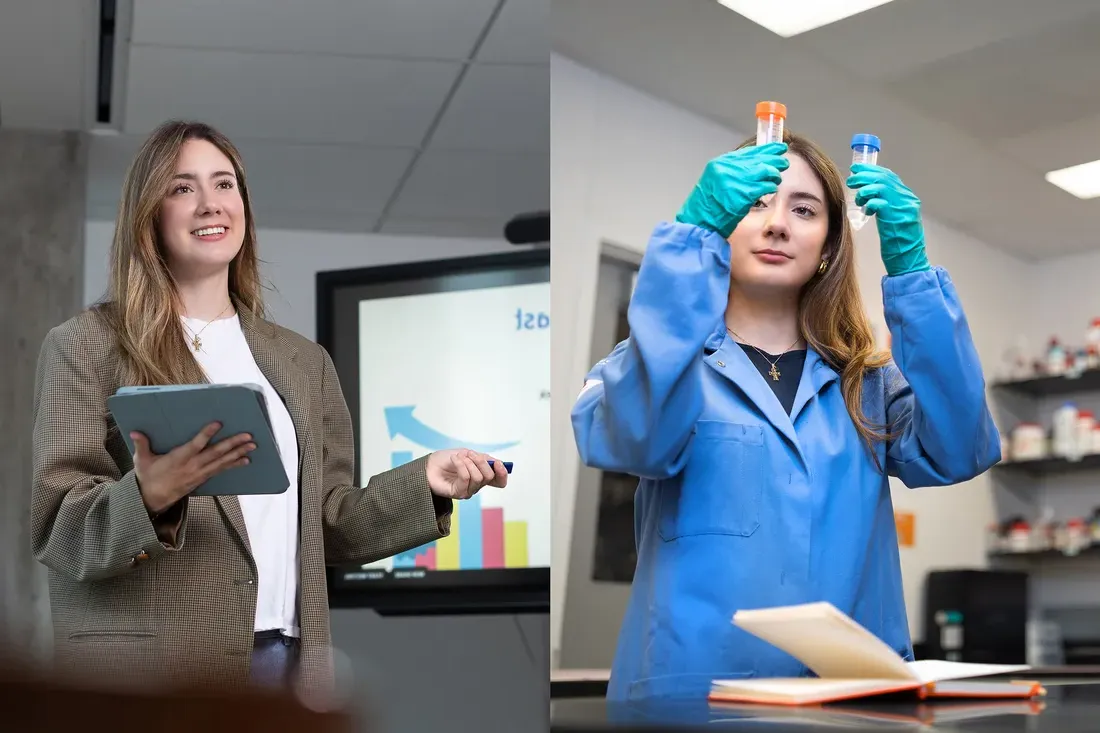Syracuse University offers hundreds of programs to enhance your academic journey. Many of them can be fashioned into dual or combined degree options. Such customization not only increases your versatility, but also broadens your potential career paths.
Whether you’re pursuing a traditional academic path or a unique degree pairing, you can tailor your education to suit your goals and interests. We, in turn, strive to give you a well-rounded education that sets you apart from the competition.
Here are a few ways that Syracuse students merge distinct disciplines into a single streamlined experience.
Public Relations/Anthropology
Taylor Byrne ’25

Taylor Byrne ’25 is an aspiring public relations practitioner, majoring in public relations and minoring in anthropology
Taylor Byrne ’25 is forging her own career path. An aspiring public relations practitioner, she majors in public relations in the S.I. Newhouse School of Public Communications. But it’s her minor in anthropology, courtesy of the College of Arts and Sciences and the Maxwell School of Citizenship and Public Affairs, that gives the Virgina native a competitive edge.
“I use my communication skills and anthropological knowledge to make culturally informed decisions about public relations,” says the Shaw Center leadership intern, who wants to work in the nonprofit or corporate social responsibility sector or the diversity, equity, inclusion and accessibility space.
Whereas the field of public relations focuses on communications management (e.g. strategies, directives and information flow), anthropology looks at human existence holistically, incorporating elements of archeology, biology, linguistics and social evolution. “Anthropology helps me understand what appeals to human nature through marketing tactics,” she adds.
The learning cadence for both disciplines is different. Public relations courses often include semester-long campaigns or research projects. Anthropology coursework, however, is a “constant flow of knowledge” culminating in a paper or presentation.
“The pairing reinforces how I learn and what I need to develop,” says the former vice president of communications for the Alpha Phi Omega service fraternity. “A healthy work-life balance is probably the most important skill I have.”
Chemistry/Management
Isabella Chavez Miranda ’25

Isabella Chavez Miranda ’25 is parlaying her studies in chemistry and management into a career in health care administration.
On the surface, chemistry and management might not have much in common, but Isabella Chavez Miranda ’25 is forging them into a career in health care administration.
“I ultimately want to bridge the gap between health care delivery and patient outcomes, especially in underserved communities,” says the Coronat Scholar, who hails from El Paso, Texas. “Understanding the technical aspects of medicinal chemistry and the operational facets of management can lead to impactful decision-making.”
In Arts and Sciences, Chavez Miranda helps Robert Doyle, the Jack and Laura H. Milton Professor and Dean’s Professor of Chemistry, develop drugs targeting Type 2 diabetes. In the Martin J. Whitman School of Management, she learns how to bring them to market.
Both instances enable Chavez Miranda to engage in practical and theoretical research, data analysis and strategic problem-solving. And with immersion experiences at Syracuse Madrid, she’s enhancing her employability and global perspective. “I’m learning how science and medicine work together to drive efficiency and innovation in health care,” she says.
Biology/Political Science
Ahmed Fakhr ’25

Ahmed Fakhr ’25 hopes to use his liberal arts background to make “systemic changes in health care.”
Ahmed Fakhr ’25 wants to be a physician. “But not just any physician,” clarifies the biology major who minors in political science. “I want to advocate for those marginalized by our health care system.”
Numerous factors contribute to health disparities and inequalities—genetic, cultural, political, financial and geographic, to name a few. By pairing his understanding of different biological systems with cross-cutting health policy perspective, he aims to help communities suffering from delayed diagnoses and poor treatment outcomes.
From participating in Syracuse’s Distinction in Biology program to serving as treasurer of both the TriBeta biology honor society and the Arab Student Association, the 19-year-old senior, who concurrently earned a high school diploma and an associate degree in mathematics and science, is keen on expanding his horizons.
Fakhr is a longtime member of the student-run Nutrition Education and Promotion Association in the David B. Falk College of Sport and Human Dynamics and the Muslim Students’ Association in Hendricks Chapel.
“It’s important to look at medical issues through a socioeconomic and political lens,” adds the Syracuse native, whose primary affiliations are with Arts and Sciences and the Maxwell School. “Syracuse is giving me a solid foundation to succeed in med school and beyond.”
Find out what academic options await you by exploring our Career Paths page.


